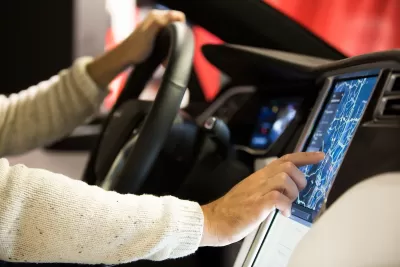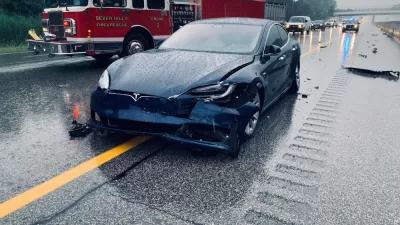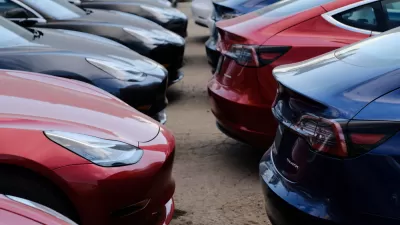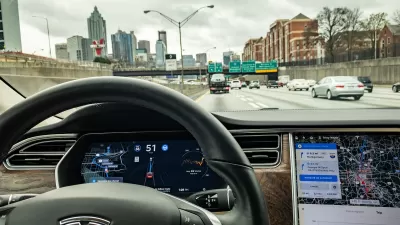A test of Tesla’s autonomous mode showed troubling permissiveness, according to one analyst.

An analyst who tested Tesla’s ‘Full Self-Driving’ mode says he “almost crashed,” reports Craig Trudell for Bloomberg CityLab.
Although William Stein says the vehicle showed impressive responsiveness to lane closures, potholes, and traffic flow, “What was surprising and went poorly, he said, was the system’s permissiveness — he was no longer required to tug on the steering wheel to keep FSD engaged, and was able to continue using it even while taking his eyes off the road.”
Stein says he had to intervene to prevent the Tesla from rear-ending another car, as well as when a police officer signaled them to slow down for a funeral procession. The car also changed lanes in a curvy section of highway where switching lanes is prohibited. According to Stein, the FSD system is “not even close to ‘solving’ autonomy.”
The company, like other autonomous carmakers, has repeatedly come under fire from state and federal regulators for its marketing of autonomous technology.
FULL STORY: Tesla Analyst Nearly Crashes While Using ‘Full Self-Driving’

Trump Administration Could Effectively End Housing Voucher Program
Federal officials are eyeing major cuts to the Section 8 program that helps millions of low-income households pay rent.

Planetizen Federal Action Tracker
A weekly monitor of how Trump’s orders and actions are impacting planners and planning in America.

Ken Jennings Launches Transit Web Series
The Jeopardy champ wants you to ride public transit.

Crime Continues to Drop on Philly, San Francisco Transit Systems
SEPTA and BART both saw significant declines in violent crime in the first quarter of 2025.

How South LA Green Spaces Power Community Health and Hope
Green spaces like South L.A. Wetlands Park are helping South Los Angeles residents promote healthy lifestyles, build community, and advocate for improvements that reflect local needs in historically underserved neighborhoods.

Sacramento Plans ‘Quick-Build’ Road Safety Projects
The city wants to accelerate small-scale safety improvements that use low-cost equipment to make an impact at dangerous intersections.
Urban Design for Planners 1: Software Tools
This six-course series explores essential urban design concepts using open source software and equips planners with the tools they need to participate fully in the urban design process.
Planning for Universal Design
Learn the tools for implementing Universal Design in planning regulations.
Heyer Gruel & Associates PA
Ada County Highway District
Institute for Housing and Urban Development Studies (IHS)
City of Grandview
Harvard GSD Executive Education
Toledo-Lucas County Plan Commissions
Salt Lake City
NYU Wagner Graduate School of Public Service





























